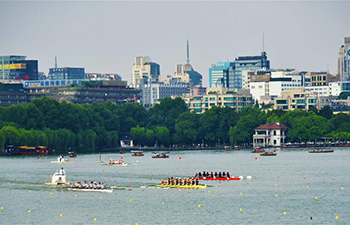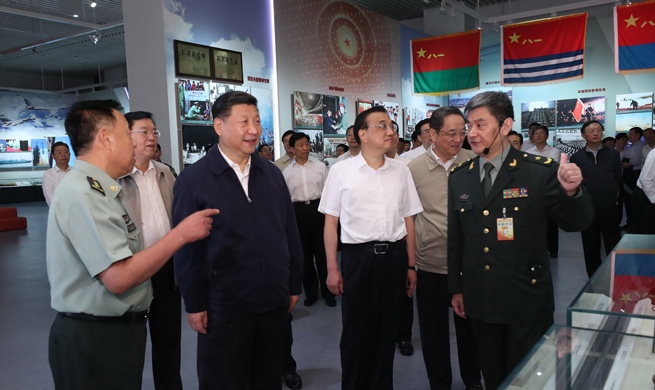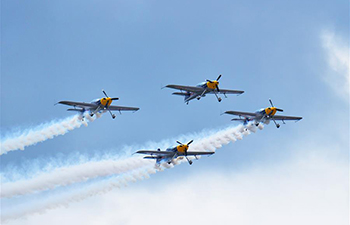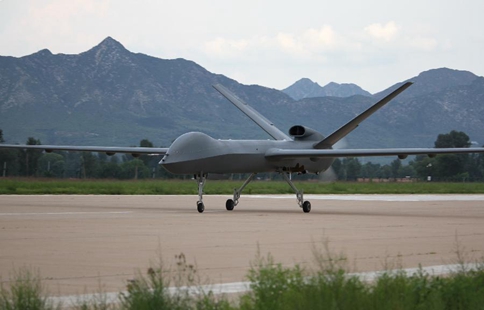ISTANBUL, July 22 (Xinhua) -- Turkey's intention to purchase Russian-made S-400 air defense system may leave its NATO allies with the feeling that Ankara is drifting away from the West, analysts told Xinhua.
"Such a move would be perceived as getting away from NATO," said Haldun Solmazturk, a retired army general in the Turkish military.
The deal over Russia's sophisticated S-400 system is at the final stage now, with only some details remaining to be settled, according to latest statements from Turkish and Russian officials.
If finalized, the deal may send out a message that Turkey is moving away from NATO, remarked Celalettin Yavuz, a security policy analyst from Istanbul Ayvansaray University.
Reports of the deal being close to be done appeared one after the other in the Turkish media last week.
The negotiations for the long range S-400 missiles that started last year are about to be concluded in a positive way, Turkish Defense Minister Fikri Isik told reporters on Tuesday. He underlined, however, that it would be wrong to say the deal is done before the final signatures are put.
Solmazturk feels that Isik's remarks may imply that Turkey could give up shopping the Russian system in the end, while remarks by a high-level Russian official on Wednesday raised doubts about the deal as well.
"Despite having reached an agreement in principle, our negotiations with Turkey about the S-400 are going on," Dmitry Shugayev, director of the Federal Service for Military-Technical Cooperation, was quoted as saying by Sputnik.
Under U.S. and NATO pressure, Turkey backed away in 2015 from a deal with a Chinese firm for the supply of an air defense system.
"Buying an air defense system from Russia would be a historic move," Solmazturk stated, noting air defense system is the one area in which integration among NATO countries is the highest priority.
If the deal is concluded, Turkey would be increasingly seen by NATO as an outsider despite being officially part of the defense bloc, he maintained.
NATO and the U.S. flatly reject the integration of a foreign air defense unit to the NATO's radar system. Turkey said the Russian system will not be incorporated into the NATO defense system.
U.S. Secretary of Defense James Mattis underlined at a press meeting last week that the Russian system would not be interoperable with the NATO systems. "We'll have to see, does it (the deal) go through? Do they (the Turks) actually employ it? Do they employ it only in one area?" he said.
Turkey awarded its first tender for a long-range air defense system to a Chinese firm in 2013, criticizing its grumbling NATO partners for failing to include transfer of technology and asking for a higher price in their own bids for the tender.
"The U.S. would be disturbed by the Russian sale of weapons to Turkey," said Yavuz, a retired captain in the Turkish Navy. "It may also try to exert pressure over Turkey."
Turkey's ties with some of its NATO partners, including the U.S. and Germany, have been strained in recent years, as Ankara accuses them of hosting terrorists or providing weapons to them.
As to Washington, its continued arming of and reliance on the Kurdish militia forces in Syria in the battle against the Islamic State is an anathema to Ankara in particular and has alienated bilateral ties.
Turkish President Recep Tayyip Erdogan has spoken several times over the years of Turkey's willingness to be part of the Shanghai Cooperation Organization, of which Russia and China are leading members.
As a regional power, Ankara said it urgently needs a long-range air defense system.
In 2015, the U.S., Germany and the Netherlands removed their Patriot missiles stationed on Turkish soil on the grounds that Syria was no longer posing a serious threat to Turkey.
Russia's S-400 system can engage up to 36 targets simultaneously and shoot down aircraft at a range of up to 400 km. It is also effective against cruise and ballistic missiles.
Some reports said Turkey would buy four batteries of S-400 missiles for 2.5 billion U.S. dollars. The Hurriyet daily reported, however, that the country is actually planning to buy a total of 24 batteries of the defense system for the same amount.
All technical issues regarding the supply of the air defense system to Turkey have been resolved, a top Russian defense official said on Tuesday.
The statement by Sergey Chemezov, CEO of Russia's state-owned Rostec Corporation, appeared on news portals several hours after Isik's remarks on the same day.
Only administrative and financial issues remain to be settled by the two governments, Chemezov was quoted as saying.
Noting the negotiations with the Russian Ministry of Finance are underway, he reportedly added, "Most likely, some funds for this project will be provided by Turkey itself, and some will be received in the form of a loan."
According to press reports, Turkey is asking for a loan from Russia for the purchase.
The most striking detail in Chemezov's statement is that Russia would not agree to the production of the S-400 system in Turkey, as Moscow has no plan to do so.
Turkey, for its part, has been insistent on co-production and transfer of technology since it first launched the tender for the air defense system.
Buying the Russian system does not make sense if there is no transfer of technology, said Solmazturk, who currently chairs the Incek debates at the Ankara-based 21st Century Turkey Institute.
Echoing the sentiment, Yavuz said that it is highly important as well for Russia agreeing to provide technological assistance in upgrading the system in the future.
As opposed to its first attempt to acquire a long-range air defense system by a tender, Turkey has been directly negotiating with Russia without a tender.
A NATO member since 1952, Turkey has many NATO facilities and radars installed on its territory.
Buying a Russian air defense system not compatible with the NATO system would not be all that functional and cost-effective, some feel.
Edogan Karakus, a retired air force general, partly shares such a concern.
Noting Turkey has radars not integrated with the NATO system, Karakus said, "We would integrate the S-400 missiles with those radars and get satisfactory results."
The Hurriyet daily reported that the first batch of the missiles, half of the 24 batteries, would be delivered by Russia in 2019, while the rest would be jointly produced in Turkey thereafter.
An unnamed Turkish officer, cited by Bloomberg.com, also claimed that half the batteries would be produced in Turkey.
In the view of Karakus, Turkey should buy the S-400 system even if it is just a single battery and Russia would not agree to the transfer of technology.
Noting the Turkish military has a highly advanced electronic warfare base at Konya where jet pilots are trained, he said, "So our pilots would also acquire skills in electronic warfare against the S-400 if such a system is available there."

















